Toon Lambrechts is freelance journalist tegen beter weten in. Behalve in MO* Magazine en op MO.be is hij ook te lezen in onder andere Knack, EOS en Vice.
Bulgaria: Exquisite back door to the Balkan
Bulgaria does not exactly correspond to the image of a new life in Europe that refugees carry with them. But the country shares a border with Turkey, and is therefore an excellent loophole to avoid Greece on the way to Europe. The last two years the influx of refugees has tenfolded, an increase Bulgaria was not prepared for..
Finding the refugee centre Voenna Rampa is no easy task. The camp, a former technical school, is tucked away somewhere in the decrepit industrial outskirts of the Bulgarian capital Sofia. The guard at the gate reacts suspiciously, but once inside the atmosphere is relax. A group of refugees play football, the rest sits outside, waiting in the winter sun. Someone built has a snowman, probably for the first time in his life.
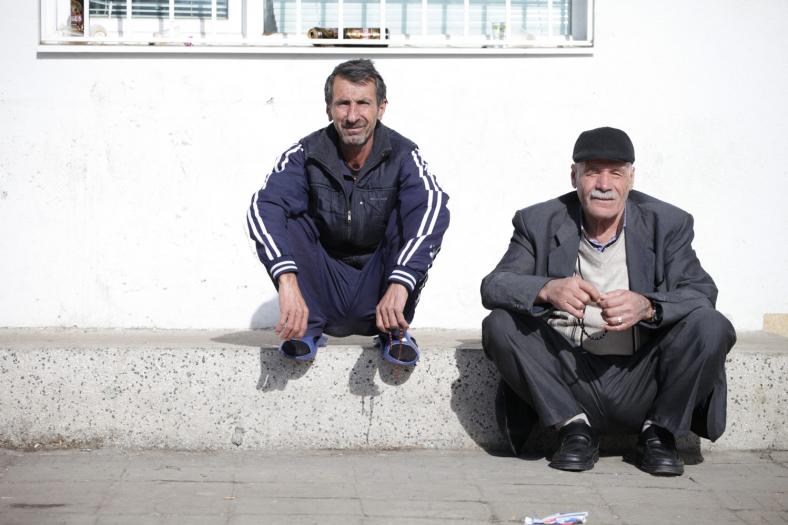
Language issue
Yet, this forced cohabitation in Voenna Rampa doesn’t run particularly smooth. Language is clearly a major barrier. The guards and the staff barely speak English, let alone one of the languages of the refugees. In all of the camp, there is but one translator who speaks Bulgarian and Arabic.
That’s not much for six hundred people, admits commander Zanev, the head of the camp. ‘We are not prepared for this. Previously, there were perhaps a few hundred refugees annually in Bulgaria, now several thousands. Mainly Syrians, but also people from Iran and Afghanistan, and Africans. That is completely new to us. I hope it stops, within a few years’, sighs the man.
Previously, there were perhaps a few hundred refugees annually in Bulgaria, now several thousands.
Chairy Bilal and Nurshan Fateh are a young Syrian-Kurdish couple from Damascus. Three months ago they left Syria. After a few days in Turkey they crossed the border with Bulgaria, a 24-hour walk through the woods of Strandzha, a large forest in the border region near the Black Sea.
Chairy is glad that he has found security here. ‘But life here in this camp is quite boring. They tell us that it will take about six months to get our papers done. Once I have them in my hands, we’ll move on. What should I do here in Bulgaria?’
A good question. Bulgaria, until further notice, remains the poorest country in the European Union, a place where many young people leave towards Western Europe, rather than a country where a new life is waiting. But the efforts of Greece to seal their land border with Turkey and the increased migration pressure reversed the roles. Suddenly, Bulgaria received an unprecedented wave of migrants.
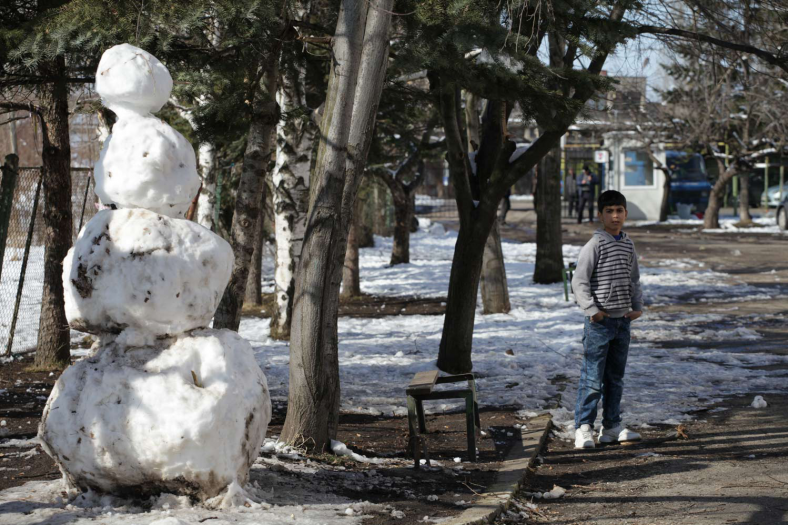
In 2013, more than 9,000 refugees crossed the border, ten times as many as the year before, all on their way to Western Europe. Hastily, the government tried to cope with the flow of people, hosting them in former schools and barracks. But the lack of money, expertise and political will made things go wrong.
Put to shame
Harmanli, a friendly but somewhat sleepy town not far from the Turkish border, made the headlines of the international media by the end of 2013. Pictures of Syrian refugees with nothing more than a tent canvas to protect against the Bulgarian winter cold went around the world. Their first experience of Europe resembled suspiciously to what they thought to have left behind.
Their first experience of Europe resembled suspiciously to what they thought to have left behind.
The failure of Bulgaria to provide the refugees a decent shelter worthy of its name was out on the street. Today, the former military area still don’t looks like a holiday destination, but the situation has clearly improved. The tents have been replaced by container houses, the roads are paved. Parts of the old barracks were renovated with the support of Europe.
Director Marko Petrov is eager to show the progress that has been made. He takes me to the new dining room and kitchen. Everything wears the blue and yellow EU-label. The laundry facility shines like new. Installed just a week ago, with support from a Dutch ngo. ‘Now Harmali hostes about 2000 inhabitants, 1600 them are Syrians, the rest from Afghanistan and Iran. That’s a lot, we’re almost at our limit, though there are plans to expand Harmanli. This time, we are ready for it.’
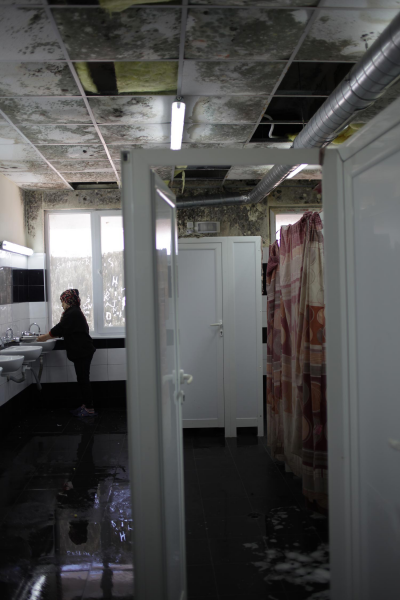
In one of the rooms of the former barracks, Gemile Hame resides with his wife and two children. He shares a room with his friend and his family. ‘This is my home, there is his’, Gemile laughs, pointing at two cubes of sheets and sticks set up in the already quite confined space.
‘I fled Syria to give my children a better life. Bulgaria is a poor country, it has hardly something to offer to its own citizens.’
Gemile, coming from Hasaka, lives already for five months in Harmanli. He has not the slightest intention to stay in Bulgaria. ‘I fled Syria to give my children a better life. Bulgaria is a poor country, it has hardly something to offer to its own citizens.’ A statement that the two Bulgarian staff members assent immediately.
Like many others Gemile passed the Turkish-Bulgarian border through the forests of Strandzha, and traveled straight to Serbia. But the Serbian border police caught him and handed him over to their Bulgarian colleagues. Gemile was detained in the detention centre Bustmansi near the Sofia Airport. Later, he was reunited with his family, now he is awaits his for papers.
When he finished his story, he takes me around to see a slightly different face of Harmanli. Half collapsed ceilings in the toilets, insulation hanging loose, moist rooms with mould spots… Clearly, much more European support will be needed before Harmanli can provide really decent accommodation.
In one of the classrooms thirty people listening to an English lesson. An initiative of the refugees themselves, says Gemali. In a room on the same corridor a friendly family wants to meet us. Their disabled son is very excited when he notice the visitors. If I ask the father how managed to cross the border with a child who can barely walk he replies that he has carried his son all the way…
Poor preparation or ill will?
Not a single migrant even considers the idea of staying in Bulgaria. The country seems to be as far as can be from the image that the rest of the world holds up about Europe. But Bulgaria is an EU member state, and therefore subjected to the Dublin Convention, which stipulates that a refugee must apply for asylum in the first country of arrival.
‘The government was not ready for the influx of 2013 because they didn’t prepared themselves.’
So those who do not manage to slip unnoticed through Bulgaria towards Serbia and get arrested by the border police must submit an application and are stuck, at least for a while, in a country where they don’t want to be and that doesn’t want them to be there.
The entire procedure to file an asylum claim is an exercise in bureauratic stiffness, with major legal gaps. As with the physical reception of refugees, the system is unable to cope with the recent influx. An unnecessary failure, says Borislav Dimitrov. ‘The government was not ready for the influx of 2013 because they didn’t prepared themselves. The information that this would happen was on the table. Everyone knows what is happening in Syria and Iraq, a conflict just one country for Bulgaria.’
Dimitrov is part of Friends of Refugees, a platform that defends the rights of refugees in Bulgaria. The images of Syrians lost in the woods of Strandzha and the situation in the Harmanli Camp spured them to action.
Back to Turkey
‘A fence has not worked in Greece, why should work for Bulgaria?’
The response of the Bulgarian government to the swelling flow of refugees has been quite predictable: Close the border. Just like in neighbouring Greece, the authorities started with construction of a fence on the border with Turkey. Furthermore, an impressive police force was deployed to the Bulgarian-Turkish border, only to be replaced last month by the army.
All this show of strength has very little effect. The number of asylum applications in 2014 differs slightly from the figure of the previous year. ‘A fence has not worked in Greece, why should work for Bulgaria?’, Borislav Dimitrov asks himself. ‘There is a plan on the table to build an additional fence of 90 km at a cost of 90 million leva (approx. 45 million euros).’
‘For a country with a limited budget such as Bulgaria, it is a shame to squander money on a so-called solution that has already proven its ineffectiveness elsewhere. But no one talks about it. It will only make the passage more dangerously. People will hop over the border at even more remote places, or perhaps by the Black Sea.’
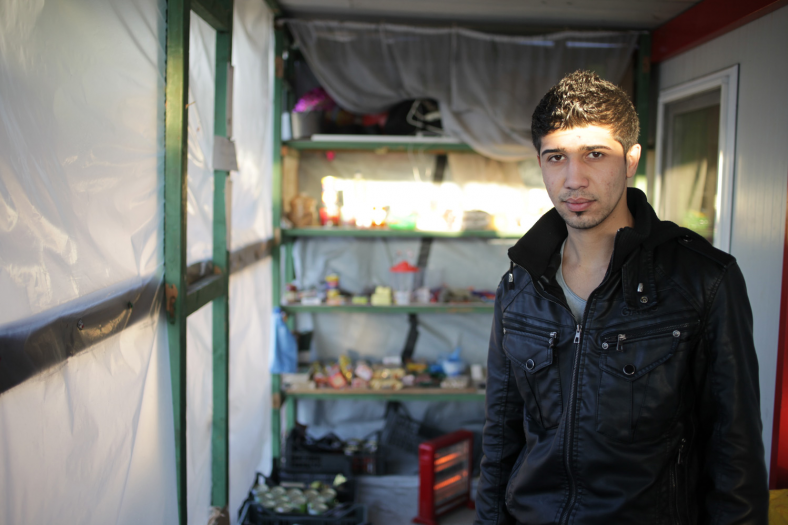
Not so much the fence, but the violence at the border deters people. Many migrants testify how they were beaten and ill-treated by the Bulgarian police, both at the border and elsewhere in Bulgaria. Police officers did not hesitate to steal money, phones and other valuables. Moreover, the border police is driving people back into Turkish territory after their arrest on the Bulgarian side of the border.
This practise, called “push-backs” are illegal under both international and under European law. ‘We hear many stories of push-backs. What would be the use of so many police at the border otherwise? What should they be doing there? The government denies that push-backs happen. They claim that they only want the refugees to use the regular border crossings. That’s nonsense, of course. Without documents you’ll never get to pass the Turkish border posts, and also in the embassy of Bulgary in Turkey it is impossible to apply for asylum.’
Tradition of migration
It is an uncomfortable situation. The refugees do not want to stay in Bulgaria at all, but find themselves trapped by the Dublin Convention. At the same time, the Bulgarian government is not keen to absorb large numbers of migrants. An integration policy, or even any plan to support people after they receive their status as asylum-seekers, is virtually nonexisting. This is problematic, and makes it even harder for people to imagine something like a future in Bulgaria.
But does it make sense to invest in an integration policy if everyone wants to move on as fast as possible? ‘Obviously, the possibilities to build a new life here are few, that’s true. But with a little more effort to integrate refugees in our society, a certain number of people would stay. Some of them are simply tired of travelling.’
‘It’s not just a lack of experience which holds back the Bulgarian government to do so, the intention is simply not there’, said Dimitrov. ‘It suits the government well that no one wants to stay, it gives them an excuse not to work on integration. But it is as much a reaction from our government against the lack of European solidarity.’
The only rise in the crime statistic is due to the violence against migrants.
Not all Bulgarians are so happy with the migration wave of the past two years. Politicians are getting out a harsh rhetoric. MPs from Ataka, one of the two nationalist parties, talk about “terrorists” and “criminals” who came to steal away Bulgaria’s scarce jobs. But the only rise in the crime statistic is due to the violence against migrants, especially in 2013, but also last year.
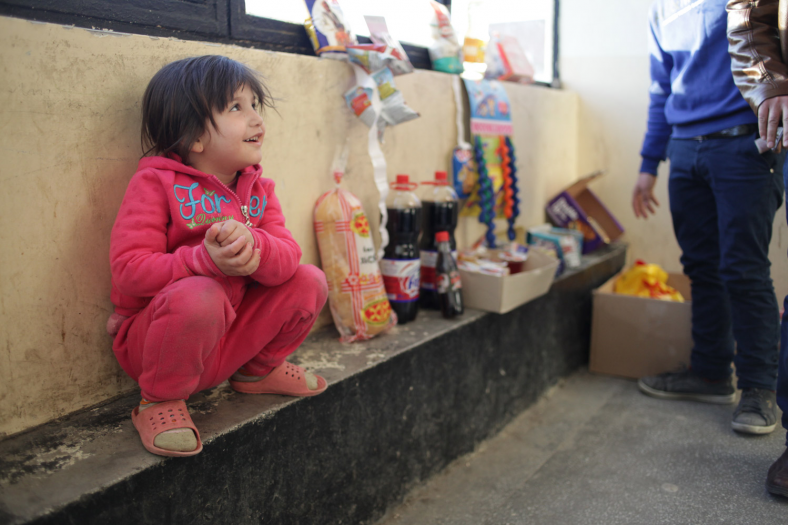
‘The state, together with the media, maintain a hard discourse when it comes to refugees. Only the Syrians are seen as genuine refugees. The rest, especially the Africans, are looked upon as merely economic migrants with no right to asylum. Migration is new to Bulgaria, so people form their opinions based on the information that the state and the media provide them. In this climate it may not come as a surprise that these hate crimes happen.’
Also in this dossier:
‘Europe, still one country ahead’
Greece: The starting line
MO*reporter undercover in human trafficking in Macedonia
‘I saw on TV how everyone was leaving Kosovo, so I went myself’
‘Do you know the way to Hungary?’
‘Welcome to Hungary (But not wholeheartedly)’
‘Human traffickers never keep their word’
Why some refugees do return to the hell of their homeland
Yet something has changed in the way in which migration is portrayed, thanks to the campaigns of Friends of Refugees and UNHCR to draw a parallel with the experience of migration of the Bulgarians themselves.
Almost every Bulgarian family has some members making a living somewhere in Western Europe as a migrant. ‘If David Cameron calls the Bulgarian immigrants in Britain profiteers, we are deeply offended. But now we are in the British position, we react in exactly the same way. However, Bulgaria is not an unwelcoming country, we have a tradition of migration ourselves. The support which our initiative Friends of Refugees received surprised everyone.’
This report was produced with the support of Fonds Pascal Decroos.

Maak MO* mee mogelijk.
Word proMO* net als 2798 andere lezers en maak MO* mee mogelijk. Zo blijven al onze verhalen gratis online beschikbaar voor iédereen.
Meer verhalen
-
Report
-
Report
-
Report
-
Interview
-
Analysis
-
Report










 Oxfam België
Oxfam België Handicap International
Handicap International